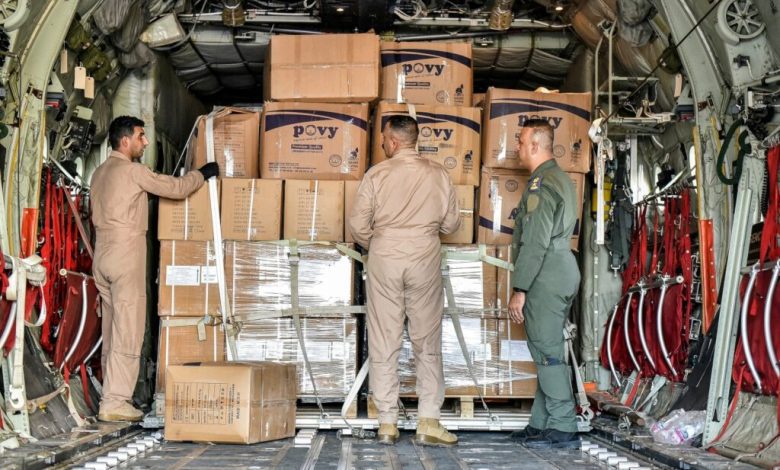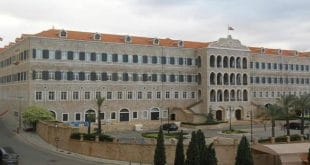يومياً تتلقى الدولة اللبنانية مساعدات إغاثية من دول ومنظمات دولية تقدّر بملايين الدولارات، فهل لهذه المساعدات إيجابيات تنعكس على الإقتصاد اللبناني أو على مالية الدولة؟
في هذا الإطار، شكر رئيس تجمع الشركات اللبنانية د. باسم البواب الدول والمنظمات الدولية التي تقدم هذه المساعدات للبنان”، لافتاً إلى أن “هذه المساعدات ليست نقدية بل هي مساعدات إغاثية وعينية بقيمة المبالغ التي يتم الإعلان عنها”. واكد انها عامل إيجابي على صعيد الإقتصاد والنازحين، وهي ضرورية في ظل العدوان الذي يحصل على لبنان”.
وشدد البواب إلى أنه ” كون هذه المساعدات غير نقدية لن تؤثر على النقد وإحتياطي النقد في مصرف لبنان بطريقة مباشرة، لكنها يمكن أن تسمح للدولة بعدم اللجوء للإحتياطي لشراء المستلزمات الأساسية والضرورية من مواد غذائية ومستلزمات طبية ومختلف الأشياء الضرورية لإيواء النازحين”.
ولفت إلى أن “الدولة كانت قد جهزت خطة طوارئ لكنها لم تتوقع حجم النزوح الهائل الذي حصل مع العدوان، كما أنها لم تؤمن تمويلاً صحيحاً لها”.
واعلن البواب ان “الدولة اللبنانية تحتاج فوراً اليوم إلى 450 مليون دولار لإستيعاب هذا النزوح، هذا في حال لم نتحدث عن مدة طويلة للعدوان، إذ أنه كلما طالت مدة العدوان سيرتفع مستوى إنفاق الدولة ليتخطى المليارات. فيومياً تحتاج الدولة لـ20 مليون دولار لإيواء النازحين بمعنى أنها شهرياً بحاجة إلى 600 مليون دولار، وهنا تستطيع أن نتوقع حجم الأزمة في حال طال أمد العدوان. وتجدر الإشارة إلى أن هذه التكاليف فقط على صعيد أزمة النازحين، ولم نتطرق بعد إلى حجم الأضرار وإعادة الإعمار”.
المصدر: lebeconomy news
### Positive Impacts of Aid on Lebanon's Economy
Lebanon receives daily relief aid from various countries and international organizations, amounting to millions of dollars. This aid has several positive effects that can impact the Lebanese economy and state finances, including:
1. **Financial Relief**:
– Dr. Bassam Al-Bawab, head of the Lebanese Companies Gathering, emphasizes that relief and in-kind aid are essential for supporting the economy amid current circumstances. Since these aids are not cash-based, they do not directly affect the reserves at Lebanon's central bank, allowing the state to utilize these resources for essential supplies without depleting reserves.
2. **Addressing Displacement**:
– With the rising number of displaced individuals due to ongoing conflict, Lebanon needs significant funding to manage this situation. Al-Bawab mentioned that the government urgently requires $450 million, as well as $20 million daily to cater to the needs of the displaced. This highlights the importance of these aids in addressing immediate needs.
3. **Stimulating Economic Activity**:
– The assistance helps stimulate local economic activity by providing food, medical supplies, and other essential items, thus supporting the local economy and reducing reliance on imports.
4. **Supporting Emergency Plans**:
– While the state had prepared an emergency plan, aid helps reinforce these efforts and provide necessary funding to tackle new challenges arising from the current situation.
5. **Facilitating Recovery and Reconstruction**:
– Over time, this assistance can play a crucial role in recovery and reconstruction efforts, with portions of the aid allocated to compensate for damages and improve affected infrastructure.
### Conclusion
Relief and in-kind aid are vital in alleviating the pressures on Lebanon's economy and state finances, especially amidst ongoing crises. Given the urgent need for funding, these aids are crucial for supporting state efforts in managing displacement and addressing humanitarian needs.
translated by economyscopes team
 سكوبات عالمية إقتصادية – EconomyScopes إجعل موقعنا خيارك ومصدرك الأنسب للأخبار الإقتصادية المحلية والعربية والعالمية على أنواعها بالإضافة الى نشر مجموعة لا بأس بها من فرص العمل في لبنان والشرق الأوسط والعالم
سكوبات عالمية إقتصادية – EconomyScopes إجعل موقعنا خيارك ومصدرك الأنسب للأخبار الإقتصادية المحلية والعربية والعالمية على أنواعها بالإضافة الى نشر مجموعة لا بأس بها من فرص العمل في لبنان والشرق الأوسط والعالم




